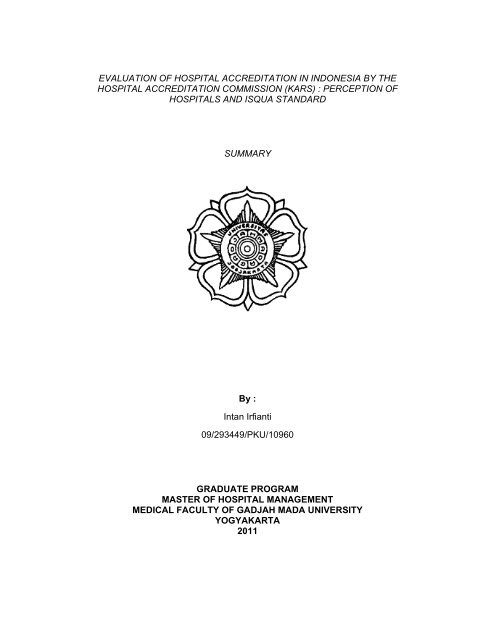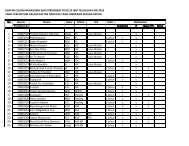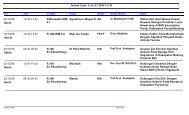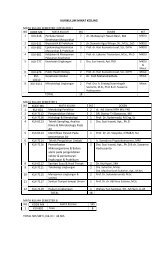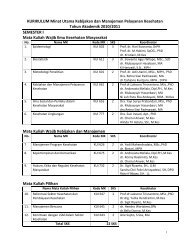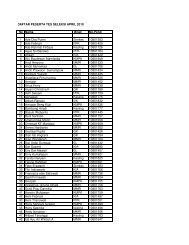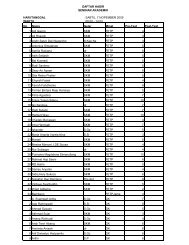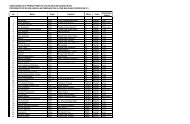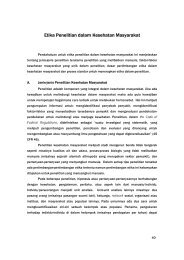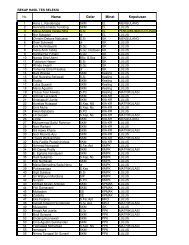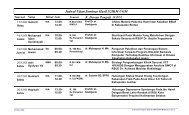evaluation of hospital accreditation in indonesia by the hospital ...
evaluation of hospital accreditation in indonesia by the hospital ...
evaluation of hospital accreditation in indonesia by the hospital ...
You also want an ePaper? Increase the reach of your titles
YUMPU automatically turns print PDFs into web optimized ePapers that Google loves.
EVALUATION OF HOSPITAL ACCREDITATION IN INDONESIA BY THE<br />
HOSPITAL ACCREDITATION COMMISSION (KARS) : PERCEPTION OF<br />
HOSPITALS AND ISQUA STANDARD<br />
SUMMARY<br />
By :<br />
Intan Irfianti<br />
09/293449/PKU/10960<br />
GRADUATE PROGRAM<br />
MASTER OF HOSPITAL MANAGEMENT<br />
MEDICAL FACULTY OF GADJAH MADA UNIVERSITY<br />
YOGYAKARTA<br />
2011
EVALUATION OF HOSPITAL ACCREDITATION IN INDONESIA BY<br />
HOSPITAL ACCREDITATION COMMISSION (KARS): PERCEPTION RS<br />
Evaluation Accreditation HOSPITAL OF THE HOSPITAL IN INDONESIA BY<br />
COMMISSION Accreditation (KARS): PERCEPTION OF Hospitals<br />
ABSTRACT<br />
Intan Irfianti 1, Adi Utar<strong>in</strong>i 2, Hanevi Djasri 3<br />
Background: One <strong>of</strong> <strong>the</strong> external assessment <strong>of</strong> <strong>the</strong> quality <strong>of</strong> <strong>hospital</strong> healthcare were<br />
conducted through KARS <strong>accreditation</strong>. Accreditation program <strong>in</strong> Indonesia was started <strong>in</strong><br />
1996 and were conducted <strong>by</strong> KARS (Hospital Accreditation Commission) that were<br />
established <strong>by</strong> <strong>the</strong> M<strong>in</strong>istry <strong>of</strong> Health. Although <strong>the</strong> benefits <strong>of</strong> <strong>accreditation</strong> were felt <strong>by</strong><br />
several parties, <strong>by</strong> 2011 only 720 (42,4 %) out <strong>of</strong> 1699 <strong>hospital</strong>s <strong>in</strong> Indonesia have<br />
participated <strong>in</strong> <strong>accreditation</strong>, whe<strong>the</strong>r it’s <strong>the</strong> 5, 12 or 16 services. The effectivity <strong>of</strong><br />
<strong>accreditation</strong> can be assessed through <strong>the</strong> perspective <strong>of</strong> <strong>hospital</strong>s <strong>by</strong> assess<strong>in</strong>g experiences<br />
or <strong>the</strong> perception <strong>of</strong> <strong>in</strong>dividuals/staffs <strong>of</strong> <strong>hospital</strong>s after <strong>the</strong>y participated and managed to<br />
picture <strong>the</strong> benefits <strong>of</strong> <strong>accreditation</strong> program. O<strong>the</strong>r assessment can be measured through<br />
objective <strong>in</strong>dicators that showed <strong>the</strong> statistical comparation <strong>of</strong> <strong>the</strong> difference <strong>of</strong><br />
performance/<strong>in</strong>dicators before and after <strong>the</strong>y implemented <strong>the</strong> <strong>accreditation</strong> standards.<br />
Objective: (1) to evalluate <strong>the</strong> effectivity <strong>of</strong> <strong>hospital</strong> <strong>accreditation</strong> <strong>by</strong> KARS <strong>in</strong> Indonesia (2)<br />
Assess<strong>in</strong>g <strong>the</strong> impact <strong>of</strong> <strong>hospital</strong> <strong>accreditation</strong> towards <strong>the</strong> quality <strong>of</strong> <strong>hospital</strong> healthcare <strong>in</strong><br />
Indonesia<br />
Method: this is a descriptive research. The subject <strong>of</strong> <strong>the</strong> research were KARS’ accreditated<br />
<strong>hospital</strong>s <strong>in</strong> Indonesia. Data collection regard<strong>in</strong>g <strong>the</strong> impact <strong>of</strong> <strong>accreditation</strong> towards <strong>hospital</strong>s’<br />
quality were conducted through mailed questionnaire that were developed from previous<br />
researches. The questionnaire were delivered to 181 <strong>hospital</strong>s that were selected as<br />
samples. The questionnaire also conta<strong>in</strong>ed open questions to ga<strong>the</strong>r <strong>in</strong>formation regard<strong>in</strong>g<br />
how <strong>the</strong> <strong>accreditation</strong> affected <strong>the</strong> <strong>hospital</strong>s’ quality and suggestions for improvement <strong>of</strong><br />
KARS’ <strong>accreditation</strong> system.<br />
Result : Generally, respondents agreed that <strong>accreditation</strong> managed to provide impact to <strong>the</strong><br />
improvement <strong>of</strong> <strong>hospital</strong>’s quality. 95.8% <strong>hospital</strong>s agreed that <strong>accreditation</strong> has encourage<br />
<strong>the</strong> participation <strong>of</strong> <strong>hospital</strong> staffs and 83.9% <strong>hospital</strong>s agreed that <strong>accreditation</strong> has impacted<br />
<strong>the</strong> effort to improve <strong>the</strong> quality <strong>of</strong> <strong>hospital</strong>s. However, only 61.5% <strong>hospital</strong>s thought that<br />
<strong>accreditation</strong> could affect <strong>the</strong> cl<strong>in</strong>ical performance <strong>of</strong> <strong>hospital</strong>s. As many as 67.9% <strong>of</strong> <strong>the</strong><br />
<strong>hospital</strong>s managed to identify various forms <strong>of</strong> <strong>accreditation</strong>’s effect to <strong>the</strong> <strong>hospital</strong>s’ quality.<br />
Answers to open questions provided <strong>in</strong>formation on suggestions <strong>of</strong> improvements to <strong>the</strong><br />
<strong>accreditation</strong> systems, such as stewardship, assessment and follow ups, <strong>accreditation</strong><br />
standards and <strong>the</strong> consistency <strong>of</strong> <strong>accreditation</strong> surveyors.<br />
Conclusion: Accord<strong>in</strong>g to <strong>the</strong> <strong>hospital</strong>s’ perception, <strong>the</strong> KARS <strong>accreditation</strong> system were<br />
effective <strong>in</strong> encourag<strong>in</strong>g staff’s engagement, adequately efffective <strong>in</strong> ecourag<strong>in</strong>g <strong>the</strong> effort to<br />
improve <strong>the</strong> quality <strong>of</strong> <strong>hospital</strong>s but were less effective towards cl<strong>in</strong>ical performance <strong>of</strong><br />
<strong>hospital</strong>s. However, <strong>the</strong>re were o<strong>the</strong>r less effective aspects such as <strong>in</strong> <strong>the</strong> post-<strong>accreditation</strong><br />
<strong>evaluation</strong>, <strong>the</strong> employed standards and <strong>accreditation</strong>’s surveyors.<br />
Keywords: healthcare quality, KARS <strong>accreditation</strong>, <strong>hospital</strong>, impact <strong>of</strong> <strong>accreditation</strong><br />
1. Hospital Management Graduate Program, Faculty <strong>of</strong> Medic<strong>in</strong>e, Gadjah Mada University, Yogyakarta<br />
2. Department <strong>of</strong> Public Health, Faculty <strong>of</strong> Medic<strong>in</strong>e, Gadjah Mada University, Yogyakarta<br />
3. Centre for Health Service Management, Gadjah Mada University, Yogyakarta
Introduction<br />
In Indonesia, to get external assessment <strong>of</strong> <strong>hospital</strong> quality service can<br />
be done through an <strong>accreditation</strong> body called KARS. Accreditation program <strong>in</strong><br />
Indonesia began <strong>in</strong> 1996, and performed <strong>by</strong> KARS (Hospital Accreditation<br />
Committee) set up <strong>by</strong> MOH 1. Despite <strong>the</strong> benefits <strong>of</strong> <strong>accreditation</strong>, <strong>in</strong> 2011<br />
only 720 <strong>hospital</strong>s (42.4%) out <strong>of</strong> <strong>the</strong> 1699 <strong>hospital</strong>s <strong>in</strong> Indonesia, have been<br />
accredited for 5, 12 or 16 services. 2<br />
Accreditation system <strong>in</strong> Indonesia today, has several drawbacks. First,<br />
<strong>the</strong> nature <strong>of</strong> <strong>the</strong> <strong>accreditation</strong> program conducted <strong>by</strong> <strong>the</strong> government creates<br />
a conflict between <strong>the</strong> government's role as a regulator or as an assessor <strong>in</strong><br />
<strong>the</strong> <strong>accreditation</strong>. Second, <strong>the</strong> standard used is still focused on <strong>in</strong>put<br />
<strong>in</strong>dicators. Thus, <strong>in</strong> its application is more likely for <strong>the</strong> occurrence <strong>of</strong> error and<br />
manipulation, and limit <strong>the</strong> impact on <strong>the</strong> quality <strong>of</strong> <strong>the</strong> service itself. The third,<br />
<strong>the</strong> standard that is published <strong>by</strong> <strong>the</strong> M<strong>in</strong>istry <strong>of</strong> Health, which is used for<br />
<strong>accreditation</strong> standards and cl<strong>in</strong>ical <strong>in</strong>dicators, were not developed <strong>in</strong> a<br />
synchronized and <strong>in</strong>tegrated manner. The application <strong>of</strong> different standards<br />
separately, with monitor<strong>in</strong>g and <strong>evaluation</strong> systems are different, does not<br />
motivate healthcare organizations to implement <strong>the</strong>se standards. 3<br />
The effectiveness <strong>of</strong> <strong>accreditation</strong> can be assessed through <strong>the</strong><br />
perspective <strong>of</strong> <strong>hospital</strong>s, namely <strong>by</strong> assess<strong>in</strong>g <strong>the</strong> perception <strong>of</strong> <strong>hospital</strong> staffs<br />
after experienc<strong>in</strong>g <strong>accreditation</strong> programs. These perceptions <strong>the</strong>n should be<br />
compared statistically with objective performance <strong>in</strong>dicators, before and after<br />
apply<strong>in</strong>g <strong>accreditation</strong> standards. 4<br />
Recommendations to improve <strong>the</strong> effectiveness <strong>of</strong> <strong>accreditation</strong><br />
programs, among o<strong>the</strong>rs: (1) <strong>accreditation</strong> program must have a good<br />
standard <strong>of</strong> <strong>accreditation</strong>, (2) national accredit<strong>in</strong>g agencies should be<br />
autonomous, have skilled human and f<strong>in</strong>ancial resources that are sufficient to<br />
operate effectively and well established; ( 3) Accreditation should pay<br />
attention to an ongo<strong>in</strong>g series <strong>of</strong> treatment processes (Cont<strong>in</strong>uum <strong>of</strong> Care)<br />
and pay attention to <strong>the</strong> limitations <strong>in</strong> <strong>the</strong> provision <strong>of</strong> care and service to<br />
patients, and (4) <strong>accreditation</strong> should be based on <strong>the</strong> needs <strong>of</strong> patients and<br />
healthcare providers and can create a culture that is open to learn<strong>in</strong>g and<br />
improvement. 5
MATERIAL AND METHOD OF RESEARCH<br />
This study is a descriptive study. Subjects were KARS accredited<br />
<strong>hospital</strong>s <strong>in</strong> Indonesia. Data collection <strong>of</strong> <strong>the</strong> impact <strong>of</strong> <strong>hospital</strong> <strong>accreditation</strong><br />
on quality <strong>of</strong> <strong>hospital</strong>s conducted <strong>by</strong> mailed questionnaire that was developed<br />
from previous studies 7 and sent to 181 <strong>hospital</strong>s selected as a sample. This<br />
questionnaire also conta<strong>in</strong>ed open questions to obta<strong>in</strong> <strong>in</strong>formation about how<br />
<strong>accreditation</strong> <strong>in</strong>fluenced <strong>the</strong> quality <strong>of</strong> <strong>hospital</strong> and suggested improvements<br />
to <strong>the</strong> <strong>accreditation</strong> system developed <strong>by</strong> KARS.<br />
RESULTS AND DISCUSSION<br />
Respondents who responded to <strong>the</strong> questionnaires were 84 <strong>hospital</strong>s<br />
(46, 4%) out <strong>of</strong> 181 <strong>hospital</strong>s that were <strong>in</strong> <strong>the</strong> sample frame. Most <strong>of</strong> <strong>the</strong><br />
<strong>hospital</strong>s who returned <strong>the</strong> questionnaire were private ones (47 or 56%). Most<br />
<strong>of</strong> <strong>the</strong>m are type C <strong>hospital</strong>s (52.4%) while type A <strong>hospital</strong>s are least to return<br />
<strong>the</strong> questionnaire (4.8%) and most <strong>of</strong> <strong>the</strong>m (39.3%) are from <strong>hospital</strong>s that<br />
have 100 – 200 beds. In addition <strong>the</strong>re were 10 <strong>hospital</strong>s (11.9%) who<br />
decl<strong>in</strong>ed to provide answers <strong>in</strong> detail.<br />
RESULTS<br />
Impact <strong>of</strong> Accreditation<br />
Respondents generally agreed that <strong>the</strong> <strong>accreditation</strong> have an impact<br />
on <strong>hospital</strong> quality improvement. A total <strong>of</strong> 95.8% RS agreed that<br />
<strong>accreditation</strong> encourages <strong>the</strong> <strong>in</strong>volvement <strong>of</strong> <strong>hospital</strong> staff and 83.9% RS<br />
agreed <strong>the</strong> impact <strong>of</strong> <strong>accreditation</strong> on <strong>hospital</strong> quality efforts. But <strong>the</strong> number<br />
<strong>of</strong> <strong>hospital</strong>s that agree on <strong>the</strong> impact <strong>of</strong> <strong>hospital</strong> <strong>accreditation</strong> on cl<strong>in</strong>ical<br />
performance is only 61.5% (Table 1).<br />
Table 1. Average Hospital Perceptions on Impact <strong>of</strong> KARS Accreditation<br />
Statement Disagree Agree<br />
S % S %<br />
A. Hospital staff <strong>in</strong>volvement (Up to Executive) In <strong>the</strong> 4 4.2 80 95.8<br />
process <strong>of</strong> <strong>hospital</strong> <strong>accreditation</strong>.<br />
B. Impact <strong>of</strong> KARS Accreditation on Hospital Quality 13 16.1 70 83.9<br />
Efforts<br />
C.Impact Of Hospital KARS Accreditation on 32 38.5 52 61.5<br />
performance
There was no difference <strong>in</strong> perception between <strong>hospital</strong> type A and B<br />
to type C and D and between <strong>the</strong> private <strong>hospital</strong> and <strong>the</strong> Government<br />
<strong>hospital</strong>. On average, respondents agreed with <strong>the</strong> <strong>in</strong>volvement <strong>of</strong> staff and<br />
<strong>the</strong> impact <strong>of</strong> <strong>hospital</strong> <strong>accreditation</strong> on quality. But only 52% <strong>of</strong> private<br />
<strong>hospital</strong>s agreed that <strong>accreditation</strong> had impact on <strong>the</strong> performance, as<br />
compared to 73% <strong>of</strong> government <strong>hospital</strong>s.<br />
In Group A statements regard<strong>in</strong>g <strong>the</strong> <strong>in</strong>volvement <strong>of</strong> staff <strong>in</strong> <strong>the</strong><br />
<strong>accreditation</strong> process, almost all <strong>of</strong> <strong>the</strong>m (4 statements) are agreed <strong>by</strong> <strong>the</strong><br />
<strong>hospital</strong>s. Even 98.8% <strong>hospital</strong>s agreed that <strong>the</strong> recommendations provided<br />
<strong>by</strong> KARS <strong>accreditation</strong> is an opportunity for <strong>hospital</strong>s to change.<br />
While <strong>in</strong> <strong>the</strong> Group B statements (16 <strong>of</strong> <strong>the</strong>m) regard<strong>in</strong>g <strong>the</strong> benefits <strong>of</strong><br />
<strong>accreditation</strong> <strong>of</strong> <strong>hospital</strong> quality efforts <strong>in</strong> general, <strong>the</strong>re were vary<strong>in</strong>g results,<br />
47,0 to 95.2% <strong>of</strong> <strong>the</strong> <strong>hospital</strong>s agreed. As an illustration, as much as 95.2%<br />
agreed that <strong>the</strong> <strong>accreditation</strong> enables improved patient care and 94% RS<br />
agreed that <strong>accreditation</strong> encourages teamwork, but only 47% agreed that <strong>the</strong><br />
<strong>accreditation</strong> <strong>in</strong>crease revenue.<br />
Impact <strong>of</strong> <strong>hospital</strong> <strong>accreditation</strong> on cl<strong>in</strong>ical performance (group C) also<br />
varied (26.2 to 78.6%), with <strong>the</strong> proportion <strong>of</strong> respondents who agree <strong>in</strong><br />
general lower than that from <strong>the</strong> statements <strong>in</strong> group A and B. For <strong>in</strong>stance as<br />
much as 78.6% <strong>of</strong> respondents agreed that <strong>accreditation</strong> can improve <strong>the</strong><br />
quality <strong>of</strong> nurs<strong>in</strong>g services and 76.2% agreed that after <strong>the</strong> <strong>accreditation</strong> <strong>the</strong><br />
<strong>hospital</strong> managed to ma<strong>in</strong>ta<strong>in</strong> <strong>the</strong> quality <strong>of</strong> health services. However, only<br />
26.2% <strong>of</strong> respondents who agreed that <strong>accreditation</strong> can reduce <strong>the</strong> number<br />
<strong>of</strong> sectio Caesarian surgery and 41.7% who agreed after <strong>the</strong> <strong>accreditation</strong><br />
<strong>hospital</strong> showed decreased mortality.<br />
Types <strong>of</strong> Influence and Suggestions to <strong>the</strong> current Accreditation System<br />
Based on answers to open questions about how <strong>accreditation</strong> <strong>in</strong>fluence<br />
<strong>of</strong> <strong>hospital</strong> <strong>accreditation</strong> on quality, a total <strong>of</strong> 67.9% <strong>hospital</strong>s can identify <strong>the</strong><br />
existence <strong>of</strong> various types <strong>of</strong> <strong>in</strong>fluence on <strong>the</strong> quality. However, o<strong>the</strong>r<br />
<strong>hospital</strong>s (29.8%) were hesitant or unable to identify <strong>the</strong> type <strong>of</strong> <strong>in</strong>fluence <strong>of</strong><br />
<strong>hospital</strong> <strong>accreditation</strong> on quality. Hospitals who stated <strong>the</strong> <strong>accreditation</strong> is<br />
<strong>in</strong>fluential, expla<strong>in</strong>ed that it encourage staffs’ compliance with standards or
egulations. In addition, some <strong>hospital</strong>s also stated that <strong>the</strong> <strong>accreditation</strong> is<br />
also useful <strong>in</strong> motivat<strong>in</strong>g human resources to enhance <strong>the</strong>ir competence, to<br />
create a conducive environment, help<strong>in</strong>g to <strong>in</strong>troduce <strong>the</strong> quality <strong>of</strong> <strong>hospital</strong>s<br />
to <strong>the</strong> community and also enhance communication systems <strong>in</strong> <strong>the</strong> <strong>hospital</strong>s.<br />
Table 2 below summarizes <strong>the</strong> suggestions for <strong>accreditation</strong> system.<br />
Table 2. Categories Suggestions for Improvement KARS Accreditation<br />
System<br />
Category<br />
Management<br />
assessment<br />
Accreditation surveyors<br />
Accreditation standards<br />
<strong>of</strong><br />
Accreditation system <strong>in</strong><br />
general<br />
Suggestion<br />
Evaluation, guidance, <strong>in</strong>formation and<br />
dissem<strong>in</strong>ation, <strong>in</strong>volvement, <strong>the</strong> survey process,<br />
cost and time<br />
Consistency and Surveyor’s competence<br />
KARS standards and standards <strong>of</strong> JCI<br />
Accreditation system, implementation, credibility<br />
and accountability, <strong>the</strong> <strong>evaluation</strong> system.<br />
DISCUSSION<br />
Perceptions about <strong>the</strong> impact <strong>of</strong> <strong>hospital</strong> <strong>accreditation</strong> on quality and<br />
Cl<strong>in</strong>ical performance <strong>of</strong> Hospital<br />
Accreditation program is considered to have successfully <strong>in</strong>fluenced<br />
<strong>the</strong> <strong>in</strong>crease or improvement <strong>in</strong> <strong>the</strong> <strong>hospital</strong> organization <strong>in</strong> general. The<br />
program stimulates <strong>in</strong>ternal motivation and commitment to self assessment<br />
and changes 8. In this study 95% agreed that dur<strong>in</strong>g preparation for<br />
<strong>accreditation</strong> <strong>the</strong>re was <strong>in</strong>volvement <strong>of</strong> all staffs and 97.6% <strong>of</strong> <strong>hospital</strong>s<br />
agreed that <strong>the</strong> <strong>hospital</strong> staffs participated <strong>in</strong> <strong>the</strong> implementation.<br />
The study shows that 53.0% <strong>of</strong> <strong>hospital</strong>s did not agree that <strong>the</strong> KARS<br />
<strong>accreditation</strong> can <strong>in</strong>crease <strong>hospital</strong> revenues. Benefits <strong>of</strong> <strong>accreditation</strong> for<br />
<strong>hospital</strong>s, among o<strong>the</strong>rs, is 'market<strong>in</strong>g', to improve <strong>the</strong> image and public trust<br />
for <strong>the</strong> <strong>hospital</strong> and as a tool for negotiat<strong>in</strong>g with third parties such as<br />
<strong>in</strong>surance company as well as o<strong>the</strong>r companies 6. Of course, <strong>the</strong>se benefits<br />
may <strong>in</strong>directly <strong>in</strong>crease <strong>the</strong> <strong>in</strong>come <strong>of</strong> RS. But it seems it has not been<br />
realized, because most <strong>of</strong> <strong>the</strong> private <strong>hospital</strong> said that <strong>the</strong> government should<br />
set a reward for <strong>the</strong> <strong>hospital</strong> that is accredited. The k<strong>in</strong>d <strong>of</strong> reward that <strong>the</strong><br />
government should give is <strong>by</strong> endors<strong>in</strong>g companies to have contracts with<br />
accredited <strong>hospital</strong>s 11. This needs attention from <strong>the</strong> government, because
<strong>accreditation</strong> will be more responsive if it has <strong>the</strong> f<strong>in</strong>ancial implications 12.<br />
Most <strong>hospital</strong>s did not agree that <strong>the</strong>re were positive impacts <strong>of</strong> KARS<br />
<strong>accreditation</strong> on cl<strong>in</strong>ical performance <strong>of</strong> <strong>the</strong> <strong>hospital</strong>s. The study shows, as<br />
many as 73.8% RS do not agree that after <strong>the</strong> KARS <strong>accreditation</strong>, <strong>the</strong><br />
<strong>hospital</strong> showed decreased number <strong>of</strong> Caesarian section and 58.3% <strong>of</strong><br />
<strong>hospital</strong>s did not agree that after <strong>the</strong> <strong>accreditation</strong>, <strong>hospital</strong> showed reduced<br />
<strong>hospital</strong> mortality.<br />
Previous research conducted <strong>in</strong> Indonesia found no significant<br />
relationship between <strong>accreditation</strong> scores with <strong>hospital</strong> performance 13. While<br />
research conducted <strong>in</strong> South Africa found that COHSASA, <strong>the</strong> Council for<br />
Health Services Accreditation <strong>of</strong> Sou<strong>the</strong>rn Africa had effectively changed<br />
structure, adm<strong>in</strong>istrative procedures and organizational processes, but did not<br />
improve measured service <strong>in</strong>dicators 9. It also expla<strong>in</strong>ed that <strong>in</strong> a review <strong>of</strong><br />
<strong>hospital</strong> <strong>accreditation</strong> conducted <strong>by</strong> Ducket <strong>in</strong> 1983, physicians are <strong>the</strong> group<br />
that experienced <strong>the</strong> least change when associated with <strong>accreditation</strong>.<br />
Additionally physician behavior is <strong>the</strong> most difficult to change. It<br />
became one <strong>of</strong> <strong>the</strong> reasons why <strong>the</strong>re was no impact <strong>of</strong> <strong>accreditation</strong> on<br />
cl<strong>in</strong>ical <strong>in</strong>dicators. This is because <strong>hospital</strong>s that jo<strong>in</strong> <strong>the</strong> <strong>accreditation</strong><br />
program will only concentrate on improv<strong>in</strong>g <strong>the</strong> structure and procedural<br />
standards. As a results, <strong>the</strong>re were little attention to cl<strong>in</strong>ical processes and<br />
outcomes. Hospital staff found it easier to implement structures, standards<br />
and procedures, because it does not require <strong>the</strong> <strong>in</strong>volvement <strong>of</strong> doctors 9.<br />
Ano<strong>the</strong>r consideration is because <strong>accreditation</strong> is <strong>the</strong> process <strong>of</strong> improv<strong>in</strong>g <strong>the</strong><br />
quality as a dynamic and ongo<strong>in</strong>g process, Therefore it is difficult to determ<strong>in</strong>e<br />
a proper way to measure <strong>the</strong> outcomes <strong>of</strong> <strong>accreditation</strong> 10.<br />
While <strong>in</strong> Indonesia, <strong>the</strong> absence <strong>of</strong> cl<strong>in</strong>ical performance impact is likely<br />
because <strong>the</strong> committee did not measure cl<strong>in</strong>ical performance <strong>in</strong>dicators, both<br />
at <strong>the</strong> time <strong>of</strong> <strong>accreditation</strong> surveys and post-<strong>accreditation</strong> monitor<strong>in</strong>g. This<br />
corroborate with <strong>the</strong> fact that currently <strong>the</strong>re are no national data on quality<br />
outcomes. 12. By not measur<strong>in</strong>g cl<strong>in</strong>ical <strong>in</strong>dicators <strong>in</strong> <strong>the</strong> <strong>accreditation</strong> process,<br />
it is not <strong>in</strong> accordance with cl<strong>in</strong>ical governance. Activities to implement <strong>the</strong><br />
basic concepts <strong>of</strong> cl<strong>in</strong>ical governance consist <strong>of</strong> activities as follows: cl<strong>in</strong>ical<br />
audit, provid<strong>in</strong>g a good quality cl<strong>in</strong>ical data, outcome measurement, cl<strong>in</strong>ical<br />
risk management, practice based evidence, poor cl<strong>in</strong>ical performance
management, and mechanisms to monitor outcomes <strong>of</strong> service 16. Accord<strong>in</strong>g<br />
to Utar<strong>in</strong>i (2011) <strong>in</strong> Indonesia <strong>the</strong> development <strong>of</strong> quality management<br />
systems and cl<strong>in</strong>ical governance runs parallel without meet<strong>in</strong>g po<strong>in</strong>t 12.<br />
Currently <strong>the</strong> trends <strong>in</strong> <strong>the</strong> quality development efforts is to focus <strong>the</strong><br />
attention to cl<strong>in</strong>icians to develop and ma<strong>in</strong>ta<strong>in</strong> service standards. This concept<br />
looks at cl<strong>in</strong>ical governance <strong>in</strong>itiative, which emphasized that any <strong>in</strong>itiative <strong>in</strong><br />
<strong>the</strong> quality <strong>of</strong> health services <strong>in</strong> <strong>the</strong> future should be directly related to <strong>the</strong><br />
quality <strong>of</strong> services 12. In Australia, this is done <strong>by</strong> putt<strong>in</strong>g <strong>the</strong> cl<strong>in</strong>ical <strong>in</strong>dicators<br />
as part <strong>of</strong> <strong>accreditation</strong>. The <strong>accreditation</strong> standards consist <strong>of</strong> three<br />
components, namely <strong>the</strong> assessment <strong>of</strong> 35 types <strong>of</strong> assessments, monitor<strong>in</strong>g<br />
<strong>of</strong> cl<strong>in</strong>ical <strong>in</strong>dicators, as well as organization and management 3.<br />
There was no difference <strong>in</strong> perception between <strong>hospital</strong> type A and B<br />
to type C and D. In average, <strong>the</strong>y agreed with <strong>the</strong> <strong>in</strong>volvement <strong>of</strong> staff <strong>in</strong> <strong>the</strong><br />
<strong>accreditation</strong> process and agrees that <strong>the</strong> impact on <strong>the</strong> quality <strong>of</strong> <strong>hospital</strong><br />
<strong>accreditation</strong>. These results differ from those <strong>in</strong> Lebanon where <strong>the</strong>re are<br />
differences <strong>in</strong> perception between large <strong>hospital</strong>s with a small <strong>hospital</strong>. Smallmedium<br />
<strong>hospital</strong> more able to feel <strong>the</strong> impact <strong>of</strong> <strong>accreditation</strong>, as compared<br />
with large <strong>hospital</strong>s 7. It is <strong>in</strong>terest<strong>in</strong>g for fur<strong>the</strong>r study because <strong>of</strong> large-scale<br />
organizations (large <strong>hospital</strong>s) more appreciative and feel <strong>the</strong> benefits <strong>of</strong><br />
<strong>accreditation</strong> than a small <strong>hospital</strong> because <strong>the</strong>y are not burdened with <strong>the</strong><br />
cost <strong>of</strong> <strong>accreditation</strong> surveys 14.<br />
Type <strong>of</strong> Influence and Suggestions to Accreditation System<br />
The majority <strong>of</strong> suggestions from <strong>the</strong> respondents were about<br />
<strong>evaluation</strong>, that <strong>in</strong>directly <strong>in</strong>tended as a coach<strong>in</strong>g process <strong>of</strong> <strong>accreditation</strong>.<br />
The absence <strong>of</strong> KARS <strong>evaluation</strong> system is also found <strong>in</strong> previous studies 3.<br />
This needs serious attention because <strong>the</strong> <strong>evaluation</strong> or review after <strong>the</strong><br />
<strong>accreditation</strong> process is essential to stimulate <strong>hospital</strong> to cont<strong>in</strong>uously<br />
improvement efforts <strong>in</strong> <strong>the</strong> period between <strong>accreditation</strong>, which is usually 3<br />
years, because if not, <strong>the</strong> organization will be <strong>of</strong>f guard and <strong>the</strong> <strong>hospital</strong> can<br />
no longer make <strong>in</strong>ternal improvements. Eventually <strong>the</strong> quality <strong>of</strong> <strong>the</strong> <strong>hospital</strong><br />
will decl<strong>in</strong>e 8. In addition, <strong>the</strong> <strong>accreditation</strong> program will be very effective when<br />
<strong>the</strong> <strong>evaluation</strong> process is comb<strong>in</strong>ed with consultation / mentor<strong>in</strong>g / coach<strong>in</strong>g to<br />
help <strong>hospital</strong>s improve <strong>the</strong> quality <strong>of</strong> service 14.
In this study <strong>the</strong>re were many suggestions relat<strong>in</strong>g to <strong>the</strong><br />
implementation <strong>of</strong> <strong>accreditation</strong> surveys (management assessment) <strong>by</strong> KARS.<br />
The process <strong>of</strong> external <strong>evaluation</strong> <strong>of</strong> <strong>the</strong> <strong>accreditation</strong> agencies is very<br />
important, because without an external <strong>evaluation</strong> process, <strong>the</strong> necessary<br />
autonomy, objectivity and transparency, <strong>the</strong> agency simply run <strong>the</strong> licens<strong>in</strong>g<br />
process not a process <strong>of</strong> <strong>accreditation</strong> 15. Based on that, <strong>the</strong> management <strong>of</strong><br />
KARS need to improve <strong>the</strong> organization so that <strong>the</strong> purpose <strong>of</strong> <strong>accreditation</strong><br />
process is achieved.<br />
Problems <strong>in</strong> surveyors’ <strong>in</strong>consistency and competence are major<br />
issues as outl<strong>in</strong>ed <strong>by</strong> <strong>the</strong> respondents. Surveyors’ <strong>in</strong>consistency problem is<br />
also found <strong>in</strong> previous studies 3. Surveyor is <strong>the</strong> key to credibility, objectivity<br />
and susta<strong>in</strong>ability <strong>of</strong> <strong>the</strong> <strong>accreditation</strong> program. Therefore recruitment<br />
process, selection, development and performance <strong>of</strong> <strong>the</strong> surveyors will assist<br />
<strong>in</strong>stitutions <strong>in</strong> provid<strong>in</strong>g quality services 8. Besides, one <strong>of</strong> <strong>the</strong> factor that<br />
<strong>in</strong>fluence <strong>accreditation</strong> success is <strong>the</strong> credibility <strong>of</strong> surveyor. The use <strong>of</strong><br />
<strong>accreditation</strong> as a means to compare <strong>the</strong> behavior <strong>of</strong> <strong>the</strong> organization or<br />
service is highly dependent on <strong>the</strong> consistency between surveyors <strong>in</strong> <strong>the</strong>ir<br />
assessments 4.<br />
The study also found <strong>the</strong>re are problems with <strong>accreditation</strong> standards<br />
KARS. This is evident from <strong>the</strong> number <strong>of</strong> <strong>hospital</strong> respondents who gave<br />
some suggestions related to <strong>the</strong> <strong>accreditation</strong> standards or <strong>in</strong>struments. Some<br />
<strong>hospital</strong>s felt that <strong>the</strong> <strong>accreditation</strong> standards KARS do not focus on patients,<br />
<strong>in</strong>clud<strong>in</strong>g <strong>the</strong> pr<strong>in</strong>ciple <strong>of</strong> cont<strong>in</strong>uum <strong>of</strong> care. One <strong>of</strong> <strong>the</strong> most important <strong>in</strong><br />
realiz<strong>in</strong>g <strong>the</strong> quality <strong>of</strong> health services is a standard <strong>of</strong> <strong>the</strong> cont<strong>in</strong>uum <strong>of</strong> care 3.<br />
Accreditation standards should be revised periodically as a process <strong>of</strong><br />
cont<strong>in</strong>uous improvement 8 . S<strong>in</strong>ce 1996 to 2000 standards / <strong>accreditation</strong><br />
<strong>in</strong>strument <strong>of</strong> KARS has been revised 4 times, based on feedback from<br />
surveyors and pr<strong>of</strong>essional organizations and associations <strong>in</strong>volv<strong>in</strong>g <strong>the</strong><br />
<strong>hospital</strong> 3. Lack <strong>of</strong> user <strong>in</strong>volvement <strong>in</strong> <strong>the</strong> revision <strong>of</strong> standards is likely to be<br />
<strong>the</strong> reason why many respondents felt less satisfied with KARS current<br />
<strong>accreditation</strong> standards.
CONCLUSIONS AND SUGGESTIONS<br />
Accord<strong>in</strong>g to <strong>the</strong> perception <strong>of</strong> <strong>hospital</strong>s, KARS <strong>accreditation</strong> system is<br />
quite effective to encourage <strong>the</strong> <strong>in</strong>volvement <strong>of</strong> staffs and promote effective<br />
quality improvement efforts as well as hav<strong>in</strong>g an impact on cl<strong>in</strong>ical<br />
performance <strong>of</strong> <strong>hospital</strong>s. But <strong>the</strong>re are some aspects that are less effective,<br />
namely <strong>in</strong> terms <strong>of</strong> post-<strong>accreditation</strong> <strong>evaluation</strong>, <strong>the</strong> standard used and<br />
<strong>accreditation</strong> surveyors.<br />
Based on <strong>the</strong>se conclusions, it is necessary to improve <strong>the</strong><br />
<strong>accreditation</strong> system periodically primarily related to <strong>the</strong> process <strong>of</strong> <strong>evaluation</strong><br />
and monitor<strong>in</strong>g <strong>of</strong> RS; <strong>the</strong> process <strong>of</strong> recruitment, tra<strong>in</strong><strong>in</strong>g, <strong>evaluation</strong> and<br />
monitor<strong>in</strong>g <strong>of</strong> surveyors; process <strong>of</strong> <strong>the</strong> preparation, revision and<br />
dissem<strong>in</strong>ation <strong>of</strong> periodic <strong>accreditation</strong> standards and to evaluate <strong>the</strong> impact<br />
<strong>of</strong> <strong>accreditation</strong> on <strong>the</strong> quality <strong>of</strong> <strong>the</strong> <strong>hospital</strong> periodically <br />
REFERENCES<br />
1. Soepojo, P., Koentjoro, T. & Utar<strong>in</strong>i, A. (2002). Benchmark<strong>in</strong>g <strong>of</strong> Hospital<br />
Accreditation System In Indonesia and Australia. Journal <strong>of</strong> Health<br />
Services Management, vol 05/N0. 02/2002, 93-101.<br />
2. Kemenkes (20 011). List <strong>of</strong> registered <strong>hospital</strong>s. Available <strong>in</strong><br />
• < www.buk.depkes.go.id > (accessed August 2011). <br />
3. Utar<strong>in</strong>i A., Koentjoro T., S. Pangestuti At Thobari & J. (2002). F<strong>in</strong>al Report:<br />
Accreditation <strong>of</strong> Health Care Organization, Health Pr<strong>of</strong>essional, and<br />
Higher Education Institution For Health Personnel Central Java<br />
Prov<strong>in</strong>ce-The World Bank. Center for Health Services Management,<br />
Faculty: Yogyakarta.<br />
4. Scrivens, E. (1997). Assess<strong>in</strong>g <strong>the</strong> value <strong>of</strong> <strong>accreditation</strong> systems.<br />
European Journal <strong>of</strong> Public Health, vol. 7 no. 1, 4-8.<br />
5. Recommendations <strong>of</strong> <strong>the</strong> WHO Expert Work<strong>in</strong>g Group on Hospital<br />
Accreditation and o<strong>the</strong>r External Quality Assessment <strong>in</strong> Health Care<br />
Systems, 7-8 February 2008, Bangkok, Thailand. Available from: <<br />
http://www.searo.who.<strong>in</strong>t/en/Section1243/Section2419_14642.htm >.<br />
(Accessed December 2010).<br />
6. Department <strong>of</strong> Health Directorate General <strong>of</strong> Medical Services Commission<br />
<strong>of</strong> Accreditation <strong>of</strong> Hospitals (2008). Guidel<strong>in</strong>es for <strong>accreditation</strong> <strong>of</strong><br />
<strong>hospital</strong>s <strong>in</strong> Indonesia: Jakarta.<br />
7. El-Jardali, F., Jamal, D., Dimassi, H., Ammar, W. & Tchaghchaghian, V.<br />
(2008). The impact <strong>of</strong> <strong>hospital</strong> <strong>accreditation</strong> on quality <strong>of</strong> care:<br />
perception <strong>of</strong> Lebanese nurses. International Journal for Quality <strong>in</strong><br />
Health Care, Volume 20, Number 5, 363-371.
8. Shaw, CD (2004). Toolkit for Accreditation Programs. The National Society<br />
for Quality In Health Care,, 1-71<br />
9. Salmon, JW, Heavens, J., Lombard, C. & Tavrow, P. (2003). The Impact on<br />
<strong>the</strong> Quality <strong>of</strong> Hospital Care: KwaZulu-Natal Prov<strong>in</strong>ce, Republic <strong>of</strong><br />
South Africa. University Research Co.., LTD. USA.<br />
10. Sack, C., Scherag, A., Lütkes, P., Gün<strong>the</strong>r, W., Jöckel, K.-H. &<br />
Holtmann, G. (2011). Is There An Association Between Hospital<br />
Accreditation And Patient Satisfaction With Hospital Care? A Survey Of<br />
37 000 Patients Treated By 73 Hospitals. International Journal for<br />
Quality <strong>in</strong> Health Care 2011; Volume 23, Number 3: pp. 278-283.<br />
11. Utari, LL (2005). The factors that underlie decision mak<strong>in</strong>g <strong>in</strong> <strong>the</strong><br />
implementation <strong>of</strong> <strong>accreditation</strong> a <strong>hospital</strong> <strong>in</strong> Medan qualitative study.<br />
Graduate Program University <strong>of</strong> North Sumatra: Medan.<br />
12. Utar<strong>in</strong>i, A. (2011). Quality Health Services <strong>in</strong> Indonesia: Responsive<br />
Regulation System. Inauguration Speech Position Pr<strong>of</strong>essor at <strong>the</strong><br />
Faculty <strong>of</strong> Medic<strong>in</strong>e, University <strong>of</strong> Gadjah Mada University. Delivered <strong>in</strong><br />
Open Meet<strong>in</strong>g Council <strong>of</strong> Pr<strong>of</strong>essors <strong>of</strong> UGM. Yogyakarta<br />
13. Maturbongs, P. (2000). Hospital Accreditation Relations Score And<br />
Performance Indicators RS. Thesis, Graduate Program <strong>of</strong> Gadjah<br />
Mada University: London.<br />
14. Montagu, Dom<strong>in</strong>ic. (2003). Accreditation and O<strong>the</strong>r External Quality<br />
Assessment System for Healthcare. Health System Resource Centre<br />
15. Purvis, GP, Jacobs, D. & Kak, N. (2010). International Health Care<br />
Accreditation Models and Country Experiences: Introductory Report on<br />
Options for <strong>the</strong> Republic <strong>of</strong> South Africa.USAID<br />
16. Djasri, H. (2006). Cl<strong>in</strong>ical Governance Through Application <strong>of</strong> ISO<br />
9000: Two Case Studies <strong>in</strong> East Java Prov<strong>in</strong>cial Hospital. Journal <strong>of</strong><br />
Health Services Management, Vol. 09, No. 3: pp.121-128


